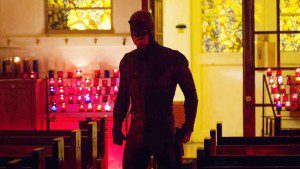
The chase ends in a church.
It’s the culmination of a frantic running confrontation—one that opens Daredevil’s second season on Netflix. Four masked bandits run down the street, carrying their ill-gotten gains in shiny briefcases. One by one, Daredevil—alias Matt Murdock, blind lawyer by day, feared vigilante by night—takes them down and knocks them out. Soon, only one is left. He grabs an innocent woman by the hair and drags her into a nearby Catholic sanctuary. Candles flicker in the back, commemorating departed loved ones. Panels of stained glass grace the front, dominated by Jesus on the cross. The bandit and his innocent victim stand before the altar, where the Sacrifice of the Mass is offered.
This is my body … this is my blood … given up for you …
There is no Mass tonight—no forgiveness for this masked, unrepentant sinner. But thanks to Daredevil [Charlie Cox], there is salvation: The innocent victim is rescued. There is justice: The bandit soon lies unconscious before the altar. There is, in a way, mercy: The man is alive, after all, and where there’s life, there’s hope: Hope for a second chance, hope for better choices in the future.
I know probably some of you have already binged your way through the entire second season of Daredevil. I only made it through the first episode so far, so no risk of spoilers here. But that first ep—as bloody as it was—illustrates why Daredevil’s one of the best superhero shows going (and a mighty spiritual one, as well).
Last season, Matt Murdock was a man divided—not just between his day job and his nocturnal vigilantism, but between his desire to do good and his thirst for blood. As a Catholic, he knows the Mass. Most nights he performs a pale imitation of it, giving his body and blood for the people of Hell’s Kitchen. But his devilish nickname is not misplaced: He’s a creature of darkness, too, a brutal vigilante who enjoys his job too much. And for much of the season, he struggled with how to deal with his prime adversary Carlton Fisk.
“Another man’s evil does not make you good,” his priest, Father Lantom, tells him. “Men have used the atrocities of their enemies to justify their own throughout history. So the question you have to ask yourself is are you struggling with the fact that you don’t want to kill this man, but have to? Or that you don’t have to kill him, but want to?”
In the end he did not. And in the early stages of Season Two, Matt seems like he’s overtly taken on the mantel of the good guy. He seems like he’s practically running the law firm for free these days, accepting pies and bananas from his cash-strapped clients in lieu of cash. In his off-hours pursuits, he’s fully embraced a no-kill ethos and seems more convinced he’s a force for good.
But there’s a new vigilante in town with none of Murdock’s ethical restraints. We don’t learn his name in the first episode, but we all know who it is: Frank Castle, a.k.a. The Punisher [Jon Bernthal]. Driven to obliterate the evil that destroyed his family, Castle takes no prisoners, offers no grace. And again, Daredevil asks us to wrestle with the morality of killing—and the sometimes seemingly blurry line between good and evil.
I’ve already given my take on superheroes who kill. In the blog I quote Batman’s Hush: “They say that when you kill a man you not only take away what he was, but all he will ever be.” You take away the promise. You take away the hope of a second chance.
“A second chance, that’s all I want,” a low-level gangster tells Murdock and company in the first episode. “Word is that Nelson and Murdock put their faith in people. And I need a little of that right now.”
Christianity is predicated on the second chance. Many would say that that belief is naïve—a recipe for hurt and disappointment and even, sometimes, disaster. Change is hard. People let you down. But I kinda think that, if we’re Christians, we’re asked to offer this sort of grace and forgiveness—even if it leaves us open to pain. We’re to be stewards of the second chance—not at the expense of justice, but as an augment to it.
Daredevil isn’t a show for everyone, of course. But I’ll be watching. Few other shows grapple as sincerely with right and wrong. I’ll be interested to see how this season’s story unfolds.












